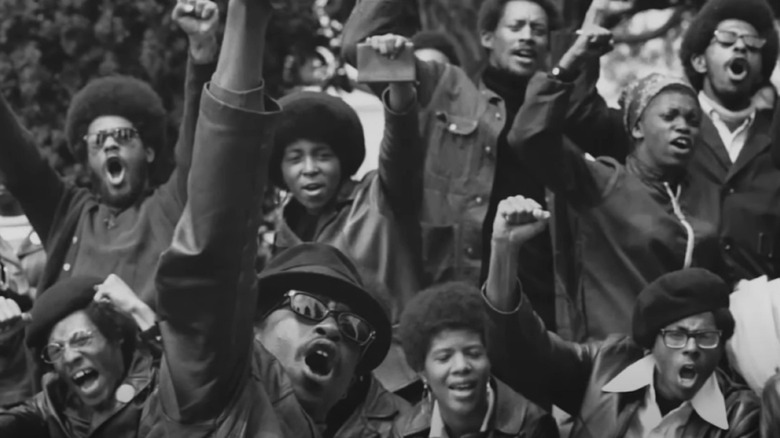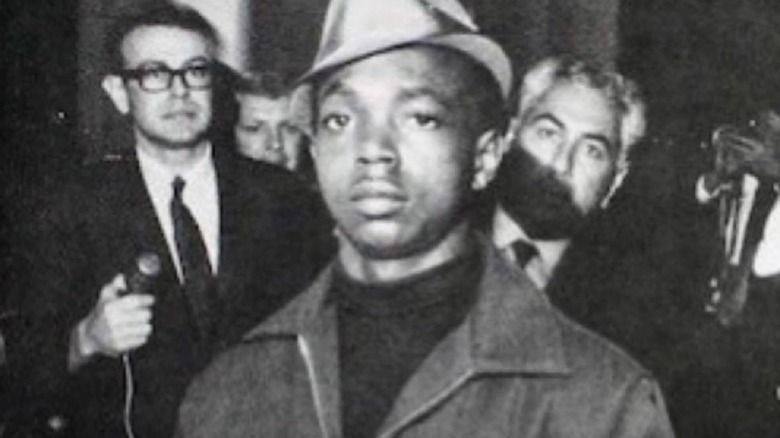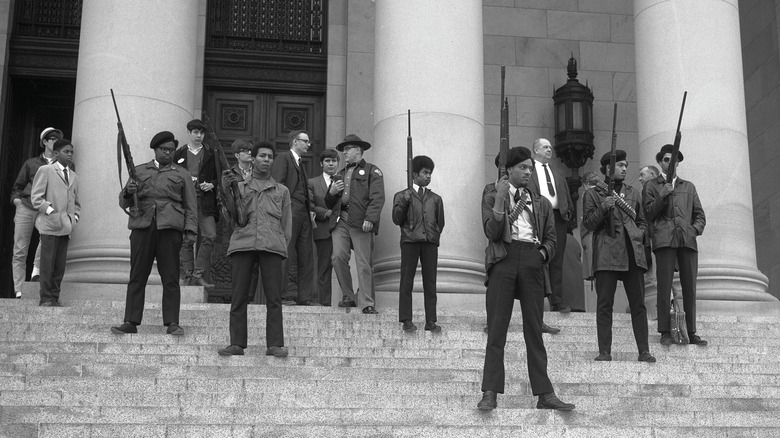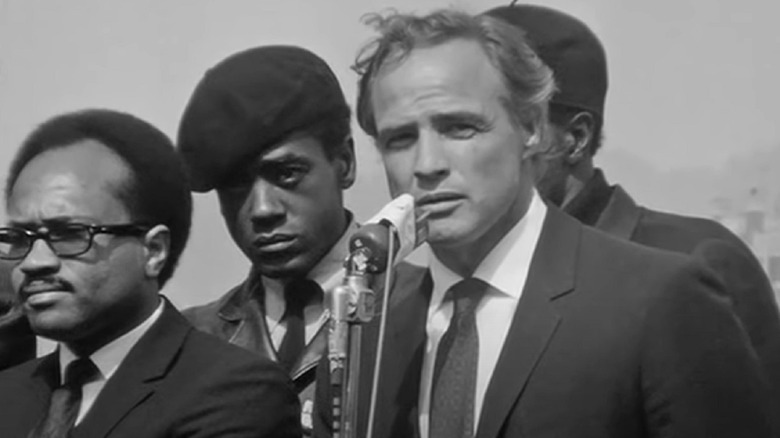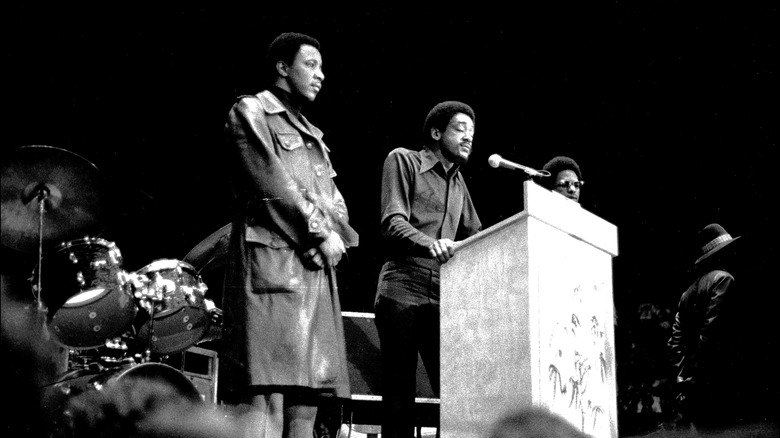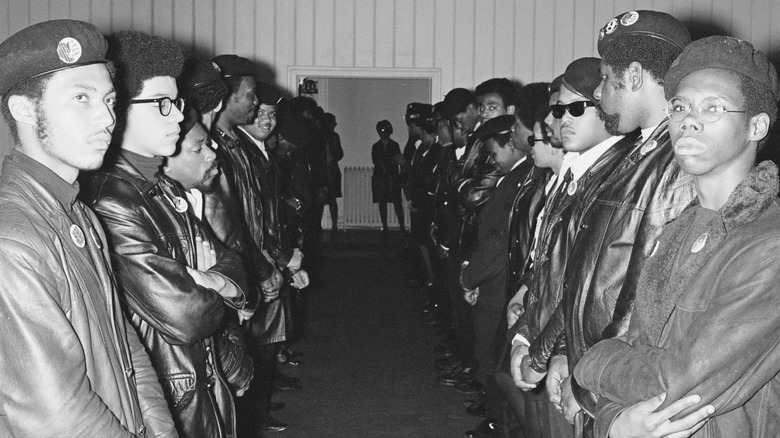How Bobby Hutton's Murder Was A Turning Point For The Black Panthers
The Black Panthers, also called the Black Panther Party for Self-Defense, was founded in October 1966 by Merritt College students Huey Newton and Bobby Seale. Prior to the establishment of the Black Panthers, the two men formed the Negro History Fact Group, with the goal to urge the college to offer classes about Black history, as noted by History. It was the assassination of human rights activist Malcolm X that pushed Newton and Seale to form the Black Panthers.
The Black Panthers were influenced by the speeches of Malcolm X, as well as the book of activist Robert Williams — "Negroes with Guns" — that pushed the practice of self-defense against the assault of the Ku Klux Klan on African Americans. The group then came up with a Ten Point Platform that included employment for the Black community, decent housing, and an end to police brutality, among others (per the National Archives). The group participated in political activities, monitored police, and engaged in social programs primarily in Oakland, California, and nearby areas before their popularity grew.
Who was Bobby Hutton?
Robert James Hutton, nicknamed Bobby or Lil' Bobby, was born in Arkansas in 1950. He was the youngest of three children born to John Hutton and Dolly Mae Hutton. Three years after his birth, the Huttons decided to move to Oakland, California, after being repeatedly harassed by vigilante racist groups allied with the Ku Klux Klan. The parents hoped that Oakland would be a safer place to raise their children (via Black Past).
Hutton first met Huey Newton and Bobby Seale at the North Oakland Anti-Poverty Center in December 1966, just months after the two men established the Black Panthers. The government-funded center employed young people to work on projects for the community. Having experienced brutality against African Americans firsthand, Hutton believed in the Black Panther Party's cause and was one of the earliest — and youngest — recruited by the group at just 16 years old. As noted by the African American Registry, Hutton became the Black Panther Party's treasurer.
The death of Bobby Hutton
In May 1967, Bobby Hutton was arrested twice for his participation in the Black Panther Party's activities. On May 2, he protested the Mulford Act — a bill prohibiting carrying loaded weapons in public — with the Black Panthers in front of the California State Capitol Building and was arrested. Just 20 days after, he was again arrested for having loaded firearms on his person in public, according to Pine Bluff. The arrests, however, didn't deter Hutton from standing up for what he believed.
After Dr. Martin Luther King Jr.'s assassination on April 4, 1968, riots transpired all across the country. On April 6, Hutton was with other Black Panther Party members traveling in two cars when a confrontation with the Oakland police occurred and two officers were shot. Hutton, together with fellow Black Panther Eldridge Cleaver, ran into the basement of an apartment building. As reported by Black Past, the exchange of shots between the two parties lasted for 90 minutes. Authorities eventually tossed a tear-gas canister into the basement, and Cleaver and Hutton decided to surrender. Cleaver was shot in the leg, so Hutton went ahead. He reportedly stripped off his clothes and put his hands in the air before he exited the building, but he was met with a barrage of bullets from the officers. He was hit more than a dozen times and died.
The aftermath of his death
According to the officers involved in the confrontation, Bobby Hutton was wearing a trench coat and attempted to flee. Eldridge Cleaver stated that the police were the instigators of the ambush, a statement that he corrected in 1980. He admitted that they were the ones who attacked the police first in retaliation to the assassination of Martin Luther King Jr., as reported by Black Past, but he insisted that Hutton was shot with his hands up. Hutton, who was then 17 years old, was the first Black Panther Party member to be killed.
Hutton's death was a major event for the Black Panthers. His funeral, held six days after his death, was attended by more than a thousand people, as noted by Face 2 Face Africa. A rally in West Oakland took place afterward, and about 2,000 people attended. Actor Marlon Brando gave a eulogy wherein he said, "time's running out for everybody."
Rise and fall of the Black Panthers Party
Black Panther Party co-founder Bobby Seale described Bobby Hutton as a young man who "was a living example of infinite love for his people . . . and their peace and freedom" (via the San Francisco Chronicle). As a result of Hutton's death, the Black Panther Party spread its influence to other cities in the U.S. where there were largely African American communities, including New York, Philadelphia, Chicago, and Los Angeles.
The Black Panthers worked on social programs, one of which was the Free Breakfast for School Children which gave about 30,000 children from different locations free food, and for some of them, it was their only meal for the day, per The Perspective. They also provided free health clinics for African American communities. Despite these efforts, however, there was growing tension between some group members, and the FBI was still looking into the Black Panther Party's activities. The FBI declared the Black Panthers a communist organization in 1969. At its peak, the organization reportedly had about 5,000 members and 40 chapters. The group was officially dissolved in 1982.
Bobby Hutton Day
The DeFremery Park located in West Oakland is often referred to as the Lil' Bobby Hutton Park. In 1998, as reported by SFGate, Oakland officially proclaimed Bobby Hutton Day a holiday — to be held in April every year — in honor of the slain Black Panther. Each year, the Hutton family, as well as former Black Panther Party members and their families, gather at the park for a memorial, followed by various activities.
Will Jennings, a former Black Panther Party member, said that Hutton was just a child with the conviction of a man. "He was a brother who at 15 had enough consciousness to see the conditions in the black community and wanted to do something about it," Jennings stated. In 2016, a grove of trees at DeFremery Park was named after Bobby Hutton to honor his heroism and martyrdom, according to the East Bay Times.
